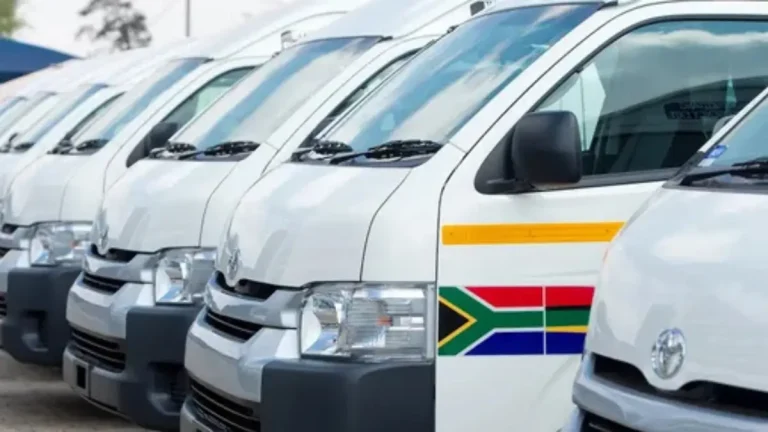Minibus taxis continue to dominate Gauteng’s transport network, carrying millions of commuters every day. However, a recent enforcement drive by the Gauteng Traffic Inspectorate (GTI) has revealed how widespread non-compliance remains within the industry. Authorities estimate that at least 35 taxi drivers are caught daily without valid licenses, exposing a serious gap in public transport safety and regulation.
Thank you for reading this post, don't forget to subscribe!ALSO READ: JMPD Warns: Illegal Pavement Parking Endangers Pedestrians
GTI Crackdown Reveals Widespread Violations
The Gauteng Traffic Inspectorate, a specialized unit of provincial traffic police, has intensified its operations across the province to clamp down on taxi-related offenses. Formed in June, the unit’s 96 officers focus on curbing taxi violence, enforcing road laws, and improving commuter safety. Despite being new, GTI has already made a powerful impact on Gauteng’s roads.
Between 29 September and 12 October, GTI officers stopped hundreds of taxis and discovered 496 drivers without valid licenses, about 35 every single day. They also found 234 vehicles without valid license discs, while 189 taxis were immediately pulled off the road for being unroadworthy. In one case, officers arrested a motorist using a cloned license disc, confirming that vehicle-related fraud runs deeper than the taxi industry alone.
Earlier operations in September painted a similar picture. Authorities removed 62 unroadworthy taxis, cited 52 drivers for expired licenses, and arrested 92 more driving without licenses at all. These recurring offenses show just how entrenched the problem has become, prompting officials to treat licensing violations as an urgent road safety threat.
Roadworthiness and Safety in the Spotlight
Many taxis failed safety inspections due to faulty brakes, broken lights, and worn tires. Each unroadworthy vehicle represents a serious hazard on Gauteng’s busy roads. The removal of nearly 200 such vehicles in just two weeks underscores the province’s commitment to passenger safety.
Transport officials have taken a harder stance against operators who prioritize profits over safety. Non-compliant drivers now face hefty fines, vehicle impoundments, and even arrest. The message is clear: those who endanger lives by ignoring the law will be held accountable.
Public Confidence and Commuter Trust
The enforcement campaign comes at a crucial time for Gauteng’s public transport system. With millions depending on minibus taxis every day, the discovery of nearly 500 unlicensed drivers has deepened public concern. Commuters often witness reckless driving, speeding, or illegal U-turns. GTI’s findings confirm that these concerns are justified and require consistent oversight.
Many passengers have welcomed the crackdown, saying it brings a long-overdue sense of order. Each unlicensed driver removed from the road strengthens commuter confidence. However, some worry about short-term disruptions, as impounded taxis could temporarily reduce available transport. Officials have promised to balance strict enforcement with the need to keep services running.
License Backlogs Add Pressure
South Africa’s national license card backlog has made compliance more complicated. A breakdown in the country’s only license card printing machine earlier this year left about 500,000 applications pending. To ease the strain, the Department of Transport waived fees for temporary driving licenses in July.
Despite this, many taxi drivers failed to collect or apply for temporary cards. Some claim they submitted applications but never received their new licenses. GTI insists that the backlog cannot serve as an excuse for non-compliance, temporary licenses remain valid and easily available. Drivers are expected to take responsibility for staying within the law, while the government must fast-track the backlog to prevent further delays.
Sustained Enforcement and a Long-Term Plan
The crackdown forms part of the Gauteng Department of Roads and Transport’s long-term strategy to restore discipline in the public transport sector. Weekly operations will continue indefinitely, with GTI teams stationed in taxi hotspots, major intersections, and provincial corridors.
In just two weeks, GTI issued 1,600 handwritten fines and logged 2,000 more via e-Force devices — more than 3,600 penalties in total. These figures highlight both the scale of the problem and the department’s commitment to confronting it. Repeat offenders now face stricter action, including license suspension and criminal prosecution.
Transport MEC Kedibone Diale-Tlabela has reiterated that commuter safety and system integrity remain top priorities. She emphasized that enforcement not only punishes offenders but also protects law-abiding taxi operators who follow the rules.
Building a Culture of Compliance
A safer road network demands cooperation from everyone. Passengers can help by reporting reckless drivers, supporting compliant operators, and refusing to board unsafe taxis. Taxi owners and associations must ensure vehicles remain roadworthy, insured, and legally licensed.
The majority of operators in Gauteng aim to run legitimate businesses, but the actions of a few undermine public trust. The industry can only regain credibility by fully aligning with enforcement initiatives and fostering a culture of accountability.
A Shared Responsibility
Gauteng’s roads carry millions daily, workers, students, parents, and children. Their safety depends on collective responsibility. Each driver who renews a license on time, each commuter who reports misconduct, and each officer who enforces the rules plays a role in transforming the system.
GTI’s recent operations mark an important turning point, proving that consistent enforcement works. To sustain progress, drivers, commuters, and authorities must stay committed. Together, Gauteng can build a transport system that is safe, fair, and worthy of the public’s trust.




